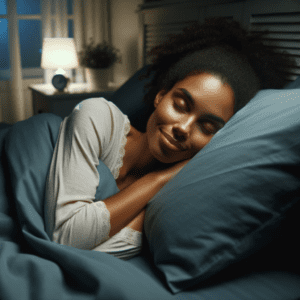
Table of Contents
Key Points to Remember
- The recommended amount of sleep varies by age group.
- Consistent sleep and wake times contribute to better sleep quality.
- Sleep cycles involve light sleep, deep sleep, and REM stages.
- Sleep deprivation negatively impacts physical and mental well-being.
Understanding Sleep Cycles: The Key to Optimal Rest
You've heard it countless times: "Get 7-8 hours of sleep per night!" While this advice is well-intentioned, sleep quality is not solely determined by duration. Your body goes through multiple sleep cycles each night, each lasting approximately 90 minutes. Understanding these cycles will give you insights into how much sleep you actually need.
Understanding the intricacies of the human sleep cycle can be crucial for optimizing health and well-being. Sleep isn't a single-phase process but involves various stages, each contributing to physical and mental restoration.
Why Understanding Your Sleep Cycle Is Crucial
Understanding the intricacies of the human sleep cycle can be crucial for optimizing health and well-being. Sleep isn't a single-phase process but involves various stages, each contributing to physical and mental restoration.
The Composition of a Sleep Cycle
A complete sleep cycle is made up of non-rapid eye movement (NREM) and rapid eye movement (REM) stages.
NREM Sleep: A Four-Stage Process
NREM sleep itself consists of four different stages, each serving unique physiological and psychological purposes.
Stage 1: The Transitional Phase
This is the transitional phase where you shift from wakefulness to sleep. It lasts for about 1–7 minutes and prepares the body for deeper sleep stages by reducing muscle activity and heart rate.
Stage 2: Light Sleep
Referred to as light sleep, this stage occupies 40-60% of total sleep time for adults. During this phase, body temperature drops and the heart rate slows further. This stage is essential for cognitive functions like memory consolidation.
Stage 3: Slow-Wave Sleep
Known as slow-wave sleep, this is the period of deep sleep crucial for physical restoration. This stage plays a key role in the removal of waste products from the brain and in immune system function.
Stage 4: Deep Sleep
This is the deepest phase of NREM sleep. It's during this period that the body focuses on healing and growth, thanks to the release of growth hormones.
REM Sleep: The Dream Stage
Following the NREM stages, REM sleep occurs, usually about 90 minutes after falling asleep. REM sleep is where most dreaming occurs and is considered important for emotional regulation and memory consolidation.
How Many Sleep Cycles Are Optimal?
Experts often recommend aiming for at least 4-6 complete sleep cycles each night, which equates to approximately 6-9 hours of sleep. Waking up in the middle of a sleep cycle can lead to sleep inertia, a period of grogginess and reduced performance, regardless of the total duration of sleep.
Sleep Cycles Conclusion
A comprehensive understanding of the various stages of the sleep cycle is not just academic but can have practical implications for everyone looking to improve their sleep quality. Ensuring you progress through 4-6 complete cycles each night can significantly impact your physical and mental well-being.

How Much Sleep Do I Need According to My Age?
Your sleep needs change as you progress through different stages of life. Here's how much sleep is generally recommended for each age group:
- Newborns: 14-17 hours
- Infants (4–12 months): 12-16 hours, including naps
- Toddlers (1–2 years): 11-14 hours, including naps
- Preschoolers (3–5 years): 10-13 hours, including naps
- School-Age Children (6-12 years): 9-12 hours
- Teenagers (13-18 years): 8-10 hours
- Adults (18 years and older): At least 7 hours
When Should I Go to Sleep and Wake Up?
The SoundOff Sleep Calculator can assist in determining your optimal bedtime and wake-up time based on your age and lifestyle. Consistency is key; try to go to sleep and wake up at the same time every day.
Tips for Enhancing Sleep Quality
- Develop a Pre-Sleep Routine: Activities like reading or meditating can help you relax.
- Limit Stimulants: Caffeine and alcohol can disrupt sleep.
- Switch Off Electronics: The blue light from devices interferes with sleep.
- Regular Exercise: Physical activity improves sleep quality.
- Optimize Sleep Environment: A comfortable mattress, minimal noise, and low light levels can significantly enhance sleep quality.
In-Depth Tips for Enhancing Sleep Quality
-
Develop a Pre-Sleep Routine:
Engaging in relaxing activities like reading or meditating before bed can help in easing into a restful sleep. A study assessed the effect of pre-sleep arousal on sleep quality among an Italian sample during the COVID-19 lockdown, indicating that pre-sleep routines could influence sleep quality1. -
Limit Stimulants:
Stimulants such as caffeine and alcohol have been shown to disrupt sleep. Alcohol, while initially acting as a sedative, can disturb sleep quality, especially when it's metabolized and remains in the body, as established in a study discussing the effects of nutrition and physical activity on sleep quality2. -
Switch Off Electronics:
The blue light emitted from electronic devices can interfere with the sleep hormone melatonin, thereby affecting sleep quality. Various studies have highlighted that screen time before bed can prolong the time it takes to fall asleep, reduce sleep quality, and affect attentiveness the following day3,4,5,6. -
Regular Exercise:
Physical activity has been linked to improved sleep quality. It can help in falling asleep more easily at night and ensures a deeper sleep. Moreover, physical activity can assist in regulating bodily functions and hormones essential in the human sleeping system7. -
Optimize Sleep Environment:
Creating a conducive sleep environment is crucial for enhancing sleep quality. This includes having a comfortable mattress, minimal noise, and low light levels. Environmental factors are indeed associated with sleep quality, and an inappropriate sleep environment can lead to disrupted sleep8,9,10,11. It's beneficial to keep the bedroom quiet, dark, and at a comfortable temperature. Moreover, removing electronic devices from the bedroom and avoiding large meals, caffeine, and alcohol before bedtime are advisable steps to optimize the sleep environment12.
By understanding your sleep needs and cycles, you can make informed decisions that improve both your sleep quality and overall well-being. SoundOff’s Sleep Calculator is a valuable tool in this journey toward better health. Give it a try and optimize your rest.

The Detrimental Effects of Insufficient Sleep on Health and Well-being
The necessity of adequate sleep is often underestimated, despite its crucial role in maintaining overall health and well-being. Chronic sleep deprivation can have dire consequences that ripple through various aspects of physical and mental health, affecting everything from cardiovascular wellness to emotional stability. Numerous studies and research projects have delved into the multifaceted consequences of sleep deficiency, offering compelling evidence of its long-term risks.
Sleep Deprivation and Heart Health
One of the most concerning repercussions of sleep deprivation is its impact on heart health. A meta-analysis published in the European Heart Journal showed that short sleepers, or individuals who sleep less than six hours a night, have a 48% increased risk of developing or dying from coronary heart disease. Furthermore, they have a 15% greater risk of experiencing a stroke compared to those who sleep for 7-8 hours per night (Cappuccio et al., 2011). The study suggests that lack of sleep can contribute to the deterioration of vital organs and should not be taken lightly.
Sleep Deprivation and Blood Pressure
Another alarming consequence of sleep deprivation is its association with elevated blood pressure. A study in the journal Hypertension demonstrated that losing just 45 minutes of sleep per night can significantly increase systolic blood pressure (Lusardi et al., 1999). High blood pressure is a well-known precursor to a myriad of other health problems, including stroke, kidney disease, and even vision loss. Thus, the consequences of missing out on sleep extend far beyond mere fatigue.
Sleep Deprivation and Weight Management
The role of sleep in weight management is also supported by scientific evidence. Lack of sleep is shown to disrupt hormonal balances, including the hormones ghrelin and leptin, which regulate hunger and satiety. A study in the journal Sleep concluded that individuals who sleep less than seven hours per night are more likely to be overweight or obese (Taheri et al., 2004). The disruption in hormonal balance can lead to increased appetite and poor dietary choices, thereby contributing to obesity—a condition associated with numerous other health risks, such as diabetes and joint problems.
Sleep Deprivation and Mental Well Being
In terms of mental well-being, the consequences of sleep deprivation are equally grim. A study published in the Journal of Clinical Psychiatry found that sleep deprivation is linked to a higher prevalence of mood disorders, including depression and anxiety (Neckelmann et al., 2007). Not only does lack of sleep affect mood, but it also impairs cognitive functions such as memory, attention, and decision-making, further deteriorating the quality of life.
Sleep Deprivation and Accidents
Lastly, the heightened risk of accidents cannot be overlooked. A report by the National Highway Traffic Safety Administration in the United States estimates that drowsy driving is responsible for 1,550 fatalities and 40,000 nonfatal injuries annually (NHTSA, 2017). Fatigue impairs reaction time and judgment, making sleep-deprived individuals more prone to accidents, both on the road and in the workplace.
Conclusion of Sleep Deprivation
The hazards of sleep deprivation are far-reaching, supported by a growing body of scientific evidence. The toll it takes on physical and mental health ranges from increased risk of heart disease and high blood pressure to weight gain and mood disorders. The heightened likelihood of accidents further accentuates the urgent need for a cultural shift towards prioritizing adequate sleep.
Recommended Hours of Sleep
Medical experts suggest adults aim for 7-9 hours of sleep, equating to approximately 5-6 full cycles. This can vary depending on your individual health and lifestyle.
Why You May Still Feel Tired After 8 Hours of Sleep
It's possible to sleep for 8 hours and still feel fatigued. This often occurs if you wake up during a sleep cycle, which disrupts the quality of your sleep.
Why Calculating Sleep Is Crucial
By understanding the intricacies of sleep cycles and how much sleep you truly need, you can greatly enhance your overall well-being. Keep your sleep in check and enjoy a more energized, healthier life. Understanding your sleep cycles and duration isn't just for trivia; it can significantly impact your quality of life. Calculating your sleep helps you optimize rest, lower health risks, and even improve longevity.
Final Thoughts: Do Sleep Calculators Work?
To determine whether a sleep calculator can help you, the best way to find out is to try it yourself. If you continue having difficulty sleeping, it's advisable to see a sleep specialist.
Frequently Asked Questions
- How many hours of sleep do adults need?
- Most adults need 7-9 hours of sleep per night for optimal functioning.
- Can you catch up on lost sleep?
- While you can temporarily make up for lost sleep, chronic sleep deprivation has lasting effects that you can't fully recover from.
- Is it better to have consistent sleep times?
- Yes, consistent sleep and wake times contribute to better sleep quality and overall well-being.

































